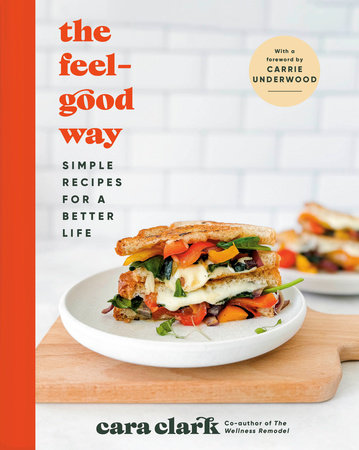Excerpt
The Feel-Good Way
IntroductionWelcome to the Feel-Good WayI’m Cara Clark. I’m a certified sports and clinical nutritionist whose clients include celebrities, professional athletes, and regular people like you and me. I’m the mother of four girls and the wife of sixteen years to a picky eater. I played basketball in college. I’m an enneagram type two—the Caregiver. I love to cook and eat good food. And at the doctor’s office, I’m one of those people who stand backward so I don’t see my weight on the scale.
My health mission as the owner of Cara Clark Nutrition (CCN) is not about weight or calories or dieting. It’s about feeling good emotionally and physically and helping others feel good without the pressure of trying to seek results on a scale. When I work with clients, I want them to look in the mirror and love and accept the person looking back at them. I want them to feel so good that they don’t question the changes they’re making or look forward to a date when they can go back to “normal.” More than twenty thousand people have joined me in my healthy eating challenges to date, and they tell me that because my philosophy isn’t about numbers or restrictions, they feel free from cravings and binging. They say they have more energy and increased mental sharpness. And the added bonus is their clothes feel a little looser.
What does feeling good mean to me? It’s having the energy to run around with my kids, seeing a glow in my skin and hair, thinking clearly without the fog, sleeping well, waking up refreshed, feeling comfortable in my clothes, and eating good food that’s not a pain to prepare. It’s teaching people to notice what food does to their bodies so they can trust themselves to eat the things they love without guilt, shame, or fear of gaining weight. And, for me, there’s one more essential element to feeling good: a connection to God and my faith.
Ninety percent of my clients come to me looking for ways to improve not just their physical health but also their spiritual health. I started to understand this connection between physical and spiritual well-being better when I experienced it for myself. Around 2017, I became the sickest I’ve ever been, with mono-like symptoms, including exhaustion, sore throat, brain fog, insomnia, and nighttime anxiety. I met with integrative practitioners, including a functional medicine doctor, a doctor of Chinese medicine, and an acupuncturist. They put me on a healing protocol and encouraged me to lean in to my faith. As I began to feel better, I started to realize how much of my sickness was because of a neglect of my spiritual well-being. Even though I had been praying and was deeply rooted in my faith, I hadn’t been tending to my spiritual self and the Holy Spirit living within me. Once I began to nourish my spirit with calming practices— listening prayer and meditation, cranial sacral therapy, infrared sauna sessions, and deep breathing—I started to understand the connection between spiritual health and the nervous system. It was a game changer for me.
As I started to work toward the improvement of my own holistic health, I better understood the cries for help that I’d been hearing from so many people who had reached out to me through emails, DMs on social media, and in their personal assessments registering for my programs. I realized that the desperation of so many people who came to me went beyond their physical health to a neglect of their spiritual well-being. They were without hope. They felt like they had tried so many different programs and had failed. They didn’t know where to turn next. People rarely came to me because they’d like to be a little healthier. Nine times out of ten, they came to me as a last-ditch effort. They were hopeless and defeated. I began to pivot my approach, understanding that my job was not only to give them hope by helping them feel better physically but also to recognize how their spiritual wounds and needs contributed to their struggle.
Physical and spiritual health are intertwined—it’s hard to have one without the other, and they work the most beautifully when they work together, as I believe God intended. I’ve been on the same journey as so many of my clients, and I’ve personally experienced how getting in touch with your physical health and well-being can open up your connection to God. This connection is felt, not measured. When we feel good physically, it gives us energy to pursue a deeper state of wellness. Maybe it comes through meditation or listening prayer. Maybe it’s going for a walk or hike and smelling scents and hearing noises you’ve never noticed before because you haven’t been connected to God’s goodness and the beauty of nature.
Feeling good allows for a better sense of mindfulness of the world going on around us. For instance, if we feel poorly and we’re driving in the car and someone cuts us off, our immediate reaction will likely reflect our state of being. If we feel good, we might be able to offer the person grace or even a wave or prayer in the moment. If we don’t feel good, well . . . our reaction can be angry, overblown, and put us in a worse state than we were before. As we grow in our nutrition, we grow in our wellness and we grow in our potential to serve those around us with love and intention.
So, feeling good—inside and out—is what this book is all about. Wherever you are in your health and in your spirit right now—whether you’re energized and hopeful or worn out and discouraged—let me welcome you to the Feel-Good Way, where just by starting to make the recipes, you are on your way to a sustainable lifestyle where your body and spirit can thrive like never before.




